 Kevin Durant rolled in on a scooter and spoke with Oklahoma City media on Tuesday for the first time since his surgery to repair a Jones fracture in his right foot, reiterating that he wouldn’t rush his return to the court.
Kevin Durant rolled in on a scooter and spoke with Oklahoma City media on Tuesday for the first time since his surgery to repair a Jones fracture in his right foot, reiterating that he wouldn’t rush his return to the court.
Durant said he noticed aching in the foot on Oct. 11 and alerted Thunder medical personnel to the issue. By the following morning, the diagnosis was known. Then, after considering his options for a few days, he underwent successful surgery on Oct. 16, at which point the team said he would be re-evaluated in about six weeks.
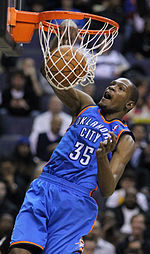 Taken literally, that could mean a potential return in early December, when the Thunder will already be 16 games into their regular season. At a bare minimum, that’s roughly 20% of the schedule — a sizable proportion — that the Thunder can expect to be without their superstar.
Taken literally, that could mean a potential return in early December, when the Thunder will already be 16 games into their regular season. At a bare minimum, that’s roughly 20% of the schedule — a sizable proportion — that the Thunder can expect to be without their superstar.
But no matter how they fare in his absence, Durant says his primary focus will be on ensuring he is fully healthy upon his return. Via Royce Young:
“I’m not going to rush it all. That’s the one thing I don’t want to do,” he said. “I’m sure I’ll feel better in two or three weeks, but definitely don’t want to rush it and wind up hurting it even more. I’m taking my time with it. I’m just blessed it happened early in the season where I can get past it, and hopefully by December I’ll be ready to play.”
Durant seemed in optimistic spirits at his Tuesday news conference, noting that his time away could be an opportunity for teammates to develop and for him to enhance his leadership skills.
“It’s definitely a different experience for me,” Durant said Tuesday. “I’ve never been injured before, but the Thunder’s been great to get me to the best surgeon, and rehab has been going well so far. Everything is progressing, and I’m looking forward to these next few weeks of getting better.”
“I feel like Nick Saban, just rolling around in my scooter from court to court giving advice and trying to help out as much as I can,” he said. “I’m looking at the positive side of it. It’s a win-win, basically, because I’m learning a lot while I’m out about the game, and my teammates are getting lots of opportunities because there are a lot of minutes out there to help the team.”
For the big picture of Durant’s career and the Oklahoma City Thunder franchise, it’s the right perspective. But for the 2014-15 season in particular, the impact of Durant’s absence could be considerable. With the Western Conference as tightly packed as it is, the gap between seedings is extremely small. Though the Thunder were the No. 2 season ago with a 59-23 mark, a dropoff of just five games would’ve put them even with Portland (54-28) for the No. 5 seed — a mark which could mean playing every postseason series without homecourt advantage.
With the margin of error so incredibly small in the West, the exact date of Durant’s return could be crucial. At a minimum, if the Thunder are going to hold up in his absence, they need good health from point guard Russell Westbrook. Westbrook missed 36 games a season ago with ongoing knee issues, but he’s appeared healthy in the preseason, and he’ll be called upon by the Thunder to step up as the primary playmaker with Durant on the sidelines.
“Nothing has to change,” Durant said of Westbrook. “Just stay who he is and continue to play the way he plays, and everybody is going to follow. He’s going to do a great job. I’m not worried about Russ.
“[He] may get more opportunities now, but you don’t have to change what you do. He knows that. He’s a smart player. He knows we all have to do it as a team, and it’s going to be fun. I’m excited to see the team play.”
Durant, the reigning league MVP, averaged 32 points, 7.4 rebounds and 5.5 assists per game in 81 games in 2013-14. He’s played the NBA’s most minutes since 2007, a number that likely contributed to the mental and physical exhaustion he cited when withdrawing from the U.S. national team.
The optimistic view is that with likely two months off, Durant could be fresher when the NBA postseason arrives next spring. In the meantime, though, the Thunder face a crucial stretch without Durant that has the potential to put them in a perilous spot in the Western Conference standings.
WITH ROCKETS IN TOWN, BOSH REFLECTS ON WHAT MIGHT HAVE BEEN
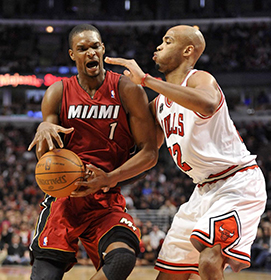 The Heat hosted the Rockets in a nationally-televised preseason game on Tuesday night, marking the first time Chris Bosh played against Houston since infamously leaving them at the altar in free agency.
The Heat hosted the Rockets in a nationally-televised preseason game on Tuesday night, marking the first time Chris Bosh played against Houston since infamously leaving them at the altar in free agency.
The common thought at the time was that if LeBron James left Miami, Bosh would also exit and head to Houston, perhaps forming a Western Conference “Super Team” with James Harden and Dwight Howard to rival LeBron’s new group in Cleveland. Courtesy of the Houston Chronicle‘s Jonathan Feigen, here’s what Bosh said Tuesday when media asked where he ranked the Rockets in his July evaluation process:
“Just like everybody else,” he said of his evaluation, “an instant title contender.”
“They’re a title contender with or without me. But I think everybody felt that.”
But in the end, money talked. When LeBron ultimately rejected Miami, the Heat were free to offer their full five-year, $118-million max contract to Bosh — a figure no outside team (including Houston) could come close to matching. The offer from Houston was for four years and reportedly about $82 million. According to Feigen, Bosh said he planned all along to hear the Heat’s final offer, but he did not expect to receive the jump to the full max contract.
“It was pretty clear,” Bosh said. “I never wanted to leave here. I always said that from the jump. My No. 1 goal was to stay here. But as talks got on, you get in the business, negotiations, things happen you didn’t think we’re going to happen. We started negotiating and that was a part of the business.
“I’m happy with my decision. I’m happy with the way things panned out.”
“I’m so comfortable here,” Bosh said. “I mean, it is Miami. I think that’s obvious. And my family, they’ve grown to really like it here. They’ve been very comfortable here. But just building that life outside of basketball has been spectacular. I have friends outside of basketball. I couldn’t imagine up and leaving. That’s why I wanted to stay from the jump.”
The extra $30-plus million in guaranteed money is certainly significant, so it’s hard to criticize Bosh for his decision. At the same time, reading between the lines in his quotes, it’s abundantly clear that money and off-court interests trumped basketball fit in his decision-making process. Similar things could also be said of Carmelo Anthony, who turned down a clearly-superior basketball situation in Chicago for a five-year, full-max-deal to stick with the rebuilding Knicks.
In the end, those are likely refreshing outcomes for both the players’ union and many NBA owners moving forward. On the players’ side, union leaders obviously need max-level players like Bosh to take full value as a means of setting the financial market for players “below” them.
Meanwhile, from an ownership standpoint, the collective bargaining agreement allows a player’s original team to offer the additional year and higher raises as an incentive to keep marquee players where they are and to give smaller- and mid-market teams a better chance at retaining elite talent. That also makes it inherently more difficult to assemble a “Super Team” like the original Big 3 of James, Bosh and Dwyane Wade in Miami, which many owners objected to on competitive grounds.
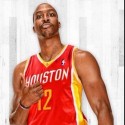 Miami and New York certainly aren’t small-market franchises, but the end result of max players choosing financial perks over superior basketball fits might signal an end to a recent trend. A year earlier, Howard turned down the extra $30 million and guaranteed year when he spurned the Lakers for a superior team in the Rockets. Likewise, James himself turned down the same perks from Miami this summer for a younger and deeper roster in Cleveland, leading some around the league to speculate that the perks were no longer enough of an incentive for franchise players to stay put.
Miami and New York certainly aren’t small-market franchises, but the end result of max players choosing financial perks over superior basketball fits might signal an end to a recent trend. A year earlier, Howard turned down the extra $30 million and guaranteed year when he spurned the Lakers for a superior team in the Rockets. Likewise, James himself turned down the same perks from Miami this summer for a younger and deeper roster in Cleveland, leading some around the league to speculate that the perks were no longer enough of an incentive for franchise players to stay put.
But for Bosh, money and off-court interests won out. The Heat won’t be what the Rockets could’ve been, but they’ll be competitive in a weak Eastern Conference, and that’s an outcome Pat Riley can smile about. Undoubtedly, many other key stakeholders around the league can, too.
AROUND THE NBA
 The Milwaukee Bucks are joining the Philadelphia 76ers and Oklahoma City Thunder in opposing the league’s proposed lottery reform, up for vote Wednesday.
The Milwaukee Bucks are joining the Philadelphia 76ers and Oklahoma City Thunder in opposing the league’s proposed lottery reform, up for vote Wednesday.
Chris Mannix of Sports Illustrated reported Tuesday that the Bucks had joined the Sixers and Thunder in opposition, but noted that the reform proposal is still expected to pass. The proposal requires 23 out of 30 votes to pass, which means at least eight “no” votes are needed to block the reform. So unless the Bucks, Sixers and Thunder can quickly find other allies, Adam Silver’s proposal seems destined to succeed.
The case for the reform would be to discourage tanking and create a more level playing field in terms of which teams have a shot at the highest picks. In contrast to the heavily-weighted lottery system used for years, the proposed alteration would give the four worst teams an equal set of odds at roughly 11 percent. That number would decline from thereon out, with the No. 5 and No. 14 teams in the lottery earning a percentage chance between 2.0 percent and 10.0 percent at the No. 1 spot.
In other words, the unpredictability of the draft lottery would grow exponentially.
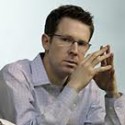 The case against it is more complex. In the short-term, teams like Philadelphia and Milwaukee with bad 2014-15 rosters could certainly be disadvantaged by having reduced odds at a top pickthe 2015 NBA Draft.
The case against it is more complex. In the short-term, teams like Philadelphia and Milwaukee with bad 2014-15 rosters could certainly be disadvantaged by having reduced odds at a top pickthe 2015 NBA Draft.
But Oklahoma City GM Sam Presti warns that the proposed reform could also significantly harm small-market franchises over the long haul, potentially tilting the playing field for marquee stars even more toward larger clubs.
Yahoo‘s Adrian Wojnarowski quoted one anonymous GM as sympathetic to Presti’s concerns:
“Everyone is too focused on Philly, on one team in one situation. The only chance for a lot of teams to ever get a transformational player is through the draft, and eventually we are all going to be in the lottery, in that spot. The teams that’ll drop from two to eight, or three to nine – that’s just going to take the air out of those fan bases and franchises. They’ll get little, if any chance, to improve.
“We are going to see more big-market teams who just missed the playoffs jump up and get a great young player at the top of the draft. And people are going to go “What the [expletive] just happened?”
Even so, Wojnarowski reports that most executives don’t see the issue as big market vs. small, but rather a short-term opportunity for their own team to get a better pick and a long-term play to discourage tanking. As a result, the reform will likely become the new draft reality come Wednesday.
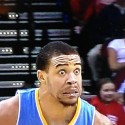 JaVale McGee is finally set to return to the court for the Nuggets.
JaVale McGee is finally set to return to the court for the Nuggets.
The Denver seven-footer, who played just five games in 2013-14 after suffering a stress fracture in his left leg, will make his 2014-15 debut either Wednesday night at home vs. Portland or Friday night at Golden State, according to Christopher Dempsey of the Denver Post.
The center has progressed to the point of taking part in full practices the last couple of times out, and he’s ready to get back on the court. He said the pain in his left tibia is down to a minimum, and he wants to get a game or two under his belt before the regular season begins.
McGee, who will initially be on a minutes restriction, last played significant minutes in the 2012-13 season, when he appeared in 79 of Denver’s 82 games. Back then, McGee averaged 9.1 points and 4.8 rebounds in just 18 minutes per game amid a crowded frontcourt on a playoff-bound squad.
This year, with Denver in something of a rebuilding mode, the Nuggets could certainly use more minutes and production from a player whom they invested heavily in. After all, McGee will make a combined $23.3 million over the next two seasons. His road back starts with getting on the floor in competitive games, though, and the 26-year-old seems ready to finally do that later this week.
Ben DuBose is a veteran sports reporter who has followed the Houston Rockets and the NBA since Hakeem Olajuwon was Akeem Olajuwon. He writes for SheridanHoops and ClutchFans, an independent Rockets blog. You can follow him on Twitter.
Why did the media want to believe that Durant would be back playing by December 1? Thunder obviously want to calm their fans.
There is a Titanium screw in his foot and in the case of, for example, Brook Lopez, he had a season ending fracture around the placement of the screw, when he returned after only 9 weeks post-surgery. Lopez played 5 games that March, with Nets wanting to impress ORL for Dwightmare I.
This opens up a whole new discussion about whether Thunder will come out of the West.